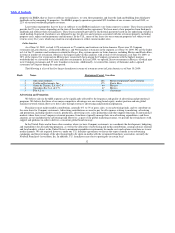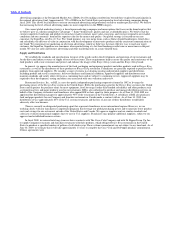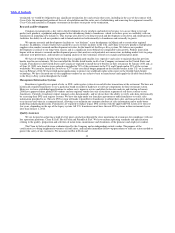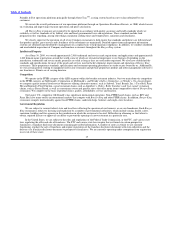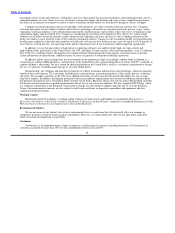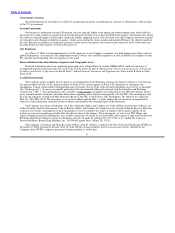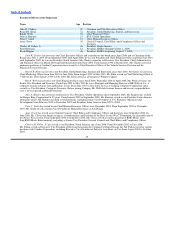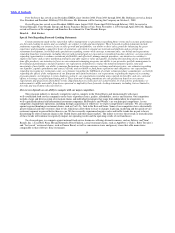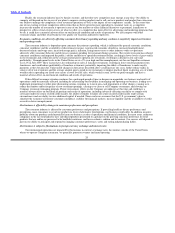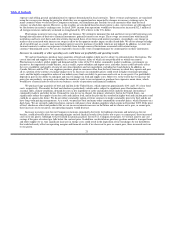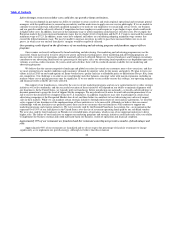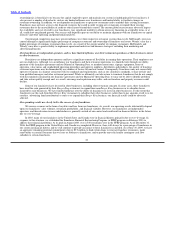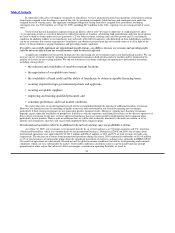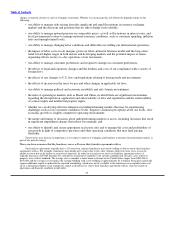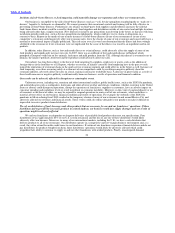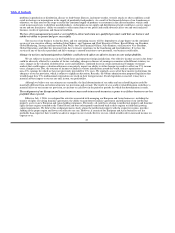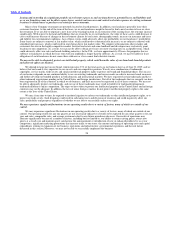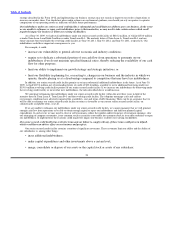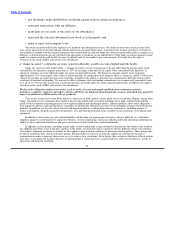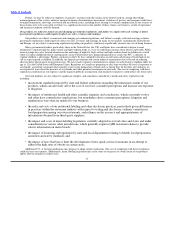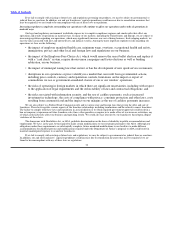Burger King 2009 Annual Report Download - page 24
Download and view the complete annual report
Please find page 24 of the 2009 Burger King annual report below. You can navigate through the pages in the report by either clicking on the pages listed below, or by using the keyword search tool below to find specific information within the annual report.
Table of Contents
Labor shortages or increases in labor costs could slow our growth or harm our business.
Our success depends in part upon our ability to continue to attract, motivate and retain regional operational and restaurant general
managers with the qualifications to succeed in our industry and the motivation to apply our core service philosophy. If we are unable to
continue to recruit and retain sufficiently qualified managers or to motivate our employees to sustain high service levels, our business
and our growth could be adversely affected. Competition for these employees could require us to pay higher wages which could result
in higher labor costs. In addition, increases in the minimum wage or labor regulations could increase our labor costs. For example, the
European markets have seen increased minimum wages due to a higher level of regulation and the U.S. Congress increased the national
minimum wage to $7.25. In addition, many states have adopted, and others are considering adopting, minimum wage statutes that
exceed the federal minimum wage. We may be unable to increase our prices in order to pass these increased labor costs on to our
guests, in which case our and our franchisees’ margins would be negatively affected.
Our operating results depend on the effectiveness of our marketing and advertising programs and franchisee support of these
programs.
Our revenues are heavily influenced by brand marketing and advertising. Our marketing and advertising programs may not be
successful, which may lead us to fail to attract new guests and retain existing guests. If our marketing and advertising programs are
unsuccessful, our results of operations could be materially adversely affected. Moreover, because franchisees and Company restaurants
contribute to our advertising fund based on a percentage of their gross sales, our advertising fund expenditures are dependent upon sales
volumes at system−wide restaurants. If system−wide sales decline, there will be a reduced amount available for our marketing and
advertising programs.
We believe that the current competitive landscape and global recession have made our customers more value−conscious, and that
we must respond to new market conditions and consumers’ demand for superior value for the money and quality. We plan to focus our
efforts in fiscal 2010 on our brand equities of flame−broiled taste, quality and size at affordable prices to differentiate Burger King from
our competitors. Our challenge is to achieve an overall product mix that balances consumer value with margin expansion, including in
markets where cost or pricing pressures may be significant. If we are unable to successfully execute this strategy, our operating margins
and financial results could be adversely affected.
The support of our franchisees is critical for the success of our marketing programs and any new capital intensive or other strategic
initiatives we seek to undertake, and the successful execution of these initiatives will depend on our ability to maintain alignment with
our franchisees. In the United States, we typically poll our franchisees before introducing any nationally− or locally−advertised price or
discount promotion to gauge the level of support for the campaign. We may decide not to move forward with certain promotions if we
fail to receive the desired level of support from our U.S. franchisees. In addition, franchisees may elect to participate in certain local
advertising campaigns at the Designated Market Area level, and their failure to contribute to local advertising may adversely impact
sales in their markets. While we can mandate certain strategic initiatives through enforcement of our franchise agreements, we need the
active support of our franchisees if the implementation of these initiatives is to be successful. Although we believe that our current
relationships with our franchisees are generally good, there can be no assurance that our franchisees will continue to support our
marketing programs and strategic initiatives. We were recently sued by the National Franchisee Association, Inc., an organization that
represents over 50% of our franchisees in the United States, over the use of restaurant operating funds paid by our soft drink vendors.
We were also sued by four franchisees in Florida over extended hours of operation, which is one of our important initiatives to drive
higher sales. The failure of our franchisees to support our marketing programs and strategic initiatives could adversely affect our ability
to implement our business strategy and could materially harm our business, results of operations and financial condition.
Approximately 90% of our restaurants are franchised and this restaurant ownership mix presents a number of disadvantages and
risks.
Approximately 90% of our restaurants are franchised and we do not expect the percentage of franchise restaurants to change
significantly as we implement our growth strategy. Although we believe that this restaurant
22


